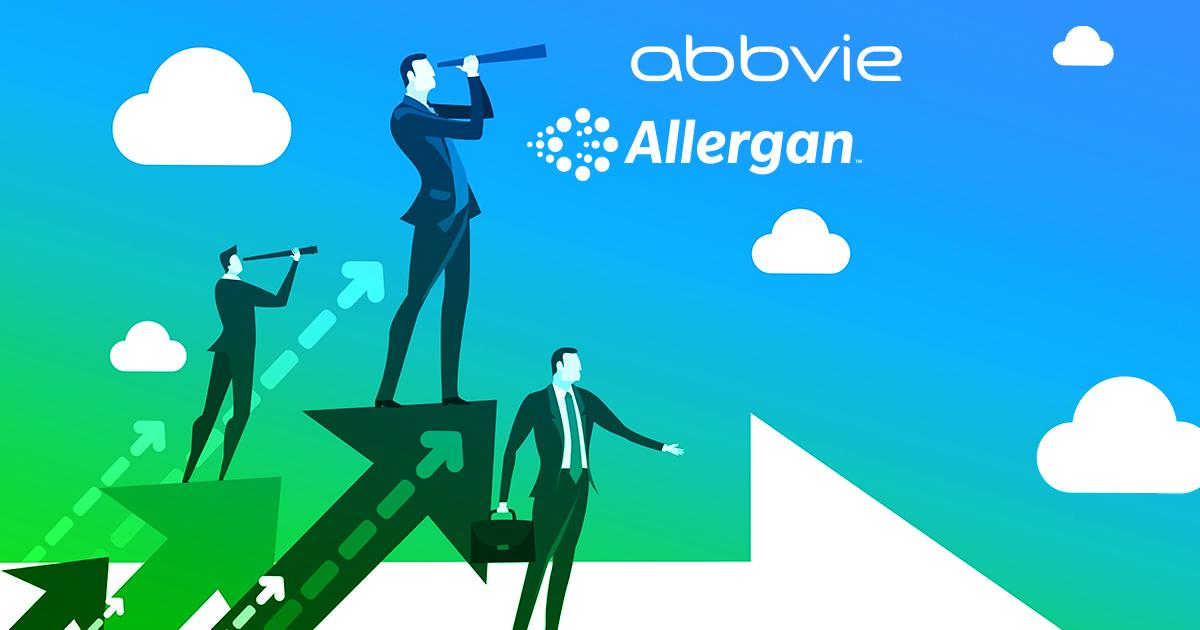
Media coverage of AbbVie’s (NYSE: ABBV) acquisition of Allergan (NYSE: AGN) in June was both bullish and bearish. In our initial coverage, we took a line from the joint press release—“…a transformative move for both companies”—which can’t be wrong no matter what happens.
Let’s look a little at that initial coverage.
First, the bears, some of whom believe AbbVie “drastically overpaid” for Allergan in the $63 billion deal. The bulls, of course, proclaimed the merger to be the best of all pharma deals and unlike some other megamergers in pharma, this one would be a “best bet.” And since the deal was announced, Allergan’s stock has increased 45% …
But what else has happened in the intervening months? Here’s a thumbnail timeline of events since July:
September: A dozen advocacy groups and unions urged the Federal Trade Commission (FTC) to take a close look at the deal and consider blocking it, as the AbbVie-Allergan combo would be the fourth largest pharmaceutical company in the world in terms of revenue (behind J&J, Roche, and Pfizer) and the merger would limit access to pharmaceuticals. By the end of the month, the FTC had initiated an antitrust review and also a 30-day extension of that review.
October: Allergan shareholders approved the deal: “AbbVie will acquire Allergan in a cash and stock transaction for a transaction equity value of approximately $63 billion, based on the closing price of AbbVie’s common stock of $78.45 on June 24, 2019,” according to a press release on the proceedings. “Allergan shareholders will receive 0.8660 AbbVie Shares and $120.30 in cash for each Allergan share, for a total consideration of $188.24 per Allergan share. The transaction is expected to close in early 2020, subject to customary closing conditions and regulatory approvals.”
November: On Nov. 1 along with its third-quarter earnings, AbbVie announced a plan to hike its 2020 quarterly dividends by 10.3% to $1.18. The optimism, apparently, was catchy. To help fund the acquisition of Allergan, AbbVie conducted a $30 billion bond sale—the largest this year and the fourth-largest in history—and buyers were eager to help. According to Barron’s, the sale clearly showed the bond investors’ confidence in the marriage. The Wall Street Journal’s MarketWatch noted that AbbVie issued 10 different bonds with maturities ranging from 1½ years to 30 years. In a third-quarter call with shareholders, AbbVie CEO Richard A. Gonzalez impressed analysts, who began to believe investor sentiment might start to abate. It helped that Gonzalez predicted high-single-digit revenue growth.
December: It’s funny what a dividend can do. A number of analysts praised AbbVie and in general predict a few good years ahead for the company. Damien Conover, writing for Morningstar, noted that “AbbVie is a stock that we think is both undervalued and well positioned with its dividend.” The dividend yield is close to 5% in a landscape where such yields are rare. Conover concluded: “[W]e think AbbVie’s yield is both secure and has potential for some modest growth over the next few years.”
Biosimilars to AbbVie’s Humira (adalimumab), the world’s largest-selling drug, will be allowed on the U.S. market by2023 and will likely impact overall sales for AbbVie. So far, though, the increased competition to Humira may not have made an impact on investors just yet. (Most analysts believe the Allergan purchase was initiated to ease the financial hit AbbVie will take when the biosimilars come to market, even though Humira will still contribute about 40% to the company’s bottom line.)
Since the beginning of the year, Allergan has been divesting drugs outside of its ophthalmic franchise to settle regulatory issues.
And that’s really where the story ends. Or does it? AbbVie management has become keenly aware of the value they have in Allergan. And Allergan’s eye-care business will continue under the careful management AbbVie has at that level, even if AbbVie did spend a 45% premium to gain Allergan’s product line. As for who stays and who goes (and that goes for product lines other than the Botox franchise, too)? Only time will tell.

